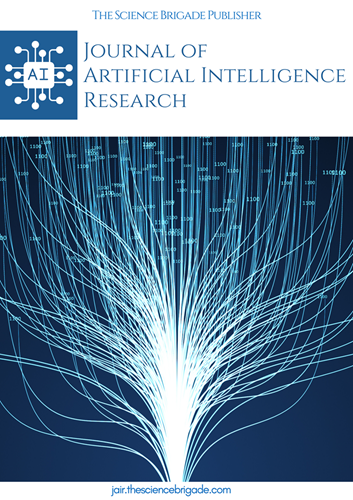Blockchain-Enabled Secure Data Sharing for AI-Driven Applications
Privacy and Efficiency Trade-offs
Keywords:
Blockchain, data sharing, artificial intelligence, privacy, efficiencyAbstract
The rapid advancement of artificial intelligence (AI) technologies has led to an increased demand for secure and efficient data sharing practices. This paper examines the role of blockchain technology in enabling secure data sharing for AI-driven applications, with a focus on privacy and efficiency trade-offs. By utilizing blockchain's decentralized nature, it becomes possible to mitigate data leakage risks and enhance trust in sensitive sectors such as healthcare and finance. This study explores how blockchain can be leveraged to create secure data-sharing environments, ensuring compliance with regulatory requirements while maintaining the efficiency needed for AI algorithms. Key challenges and potential solutions in integrating blockchain with AI are discussed, alongside real-world applications and future research directions.
References
Gayam, Swaroop Reddy. "Artificial Intelligence in E-Commerce: Advanced Techniques for Personalized Recommendations, Customer Segmentation, and Dynamic Pricing." Journal of Bioinformatics and Artificial Intelligence 1.1 (2021): 105-150.
Chitta, Subrahmanyasarma, et al. "Decentralized Finance (DeFi): A Comprehensive Study of Protocols and Applications." Distributed Learning and Broad Applications in Scientific Research 5 (2019): 124-145.
Nimmagadda, Venkata Siva Prakash. "Artificial Intelligence for Predictive Maintenance of Banking IT Infrastructure: Advanced Techniques, Applications, and Real-World Case Studies." Journal of Deep Learning in Genomic Data Analysis 2.1 (2022): 86-122.
Putha, Sudharshan. "AI-Driven Predictive Analytics for Maintenance and Reliability Engineering in Manufacturing." Journal of AI in Healthcare and Medicine 2.1 (2022): 383-417.
Sahu, Mohit Kumar. "Machine Learning for Personalized Marketing and Customer Engagement in Retail: Techniques, Models, and Real-World Applications." Journal of Artificial Intelligence Research and Applications 2.1 (2022): 219-254.
Kasaraneni, Bhavani Prasad. "AI-Driven Policy Administration in Life Insurance: Enhancing Efficiency, Accuracy, and Customer Experience." Journal of Artificial Intelligence Research and Applications 1.1 (2021): 407-458.
Vangoor, Vinay Kumar Reddy, et al. "Energy-Efficient Consensus Mechanisms for Sustainable Blockchain Networks." Journal of Science & Technology 1.1 (2020): 488-510.
Kondapaka, Krishna Kanth. "AI-Driven Demand Sensing and Response Strategies in Retail Supply Chains: Advanced Models, Techniques, and Real-World Applications." Journal of Artificial Intelligence Research and Applications 1.1 (2021): 459-487.
Kasaraneni, Ramana Kumar. "AI-Enhanced Process Optimization in Manufacturing: Leveraging Data Analytics for Continuous Improvement." Journal of Artificial Intelligence Research and Applications 1.1 (2021): 488-530.
Pattyam, Sandeep Pushyamitra. "AI-Enhanced Natural Language Processing: Techniques for Automated Text Analysis, Sentiment Detection, and Conversational Agents." Journal of Artificial Intelligence Research and Applications 1.1 (2021): 371-406.
Kuna, Siva Sarana. "The Role of Natural Language Processing in Enhancing Insurance Document Processing." Journal of Bioinformatics and Artificial Intelligence 3.1 (2023): 289-335.
George, Jabin Geevarghese, and Arun Rasika Karunakaran. "Enabling Scalable Financial Automation in Omni-Channel Retail: Strategies for ERP and Cloud Integration." Human-Computer Interaction Perspectives 1.2 (2021): 10-49.
Katari, Pranadeep, et al. "Cross-Chain Asset Transfer: Implementing Atomic Swaps for Blockchain Interoperability." Distributed Learning and Broad Applications in Scientific Research 5 (2019): 102-123.
Sengottaiyan, Krishnamoorthy, and Manojdeep Singh Jasrotia. "SLP (Systematic Layout Planning) for Enhanced Plant Layout Efficiency." International Journal of Science and Research (IJSR) 13.6 (2024): 820-827.
Venkata, Ashok Kumar Pamidi, et al. "Implementing Privacy-Preserving Blockchain Transactions using Zero-Knowledge Proofs." Blockchain Technology and Distributed Systems 3.1 (2023): 21-42.
Namperumal, Gunaseelan, Akila Selvaraj, and Deepak Venkatachalam. "Machine Learning Models Trained on Synthetic Transaction Data: Enhancing Anti-Money Laundering (AML) Efforts in the Financial Services Industry." Journal of Artificial Intelligence Research 2.2 (2022): 183-218.
Soundarapandiyan, Rajalakshmi, Praveen Sivathapandi, and Debasish Paul. "AI-Driven Synthetic Data Generation for Financial Product Development: Accelerating Innovation in Banking and Fintech through Realistic Data Simulation." Journal of Artificial Intelligence Research and Applications 2.2 (2022): 261-303.
Pradeep Manivannan, Priya Ranjan Parida, and Chandan Jnana Murthy, “Strategic Implementation and Metrics of Personalization in E-Commerce Platforms: An In-Depth Analysis”, Journal of AI-Assisted Scientific Discovery, vol. 1, no. 2, pp. 59–96, Aug. 2021
Yellepeddi, Sai Manoj, et al. "Blockchain Interoperability: Bridging Different Distributed Ledger Technologies." Blockchain Technology and Distributed Systems 2.1 (2022): 108-129.
Downloads
Published
How to Cite
Issue
Section
License

This work is licensed under a Creative Commons Attribution-NonCommercial-ShareAlike 4.0 International License.
License Terms
Ownership and Licensing:
Authors of this research paper submitted to the journal owned and operated by The Science Brigade Group retain the copyright of their work while granting the journal certain rights. Authors maintain ownership of the copyright and have granted the journal a right of first publication. Simultaneously, authors agreed to license their research papers under the Creative Commons Attribution-NonCommercial-ShareAlike 4.0 International (CC BY-NC-SA 4.0) License.
License Permissions:
Under the CC BY-NC-SA 4.0 License, others are permitted to share and adapt the work, as long as proper attribution is given to the authors and acknowledgement is made of the initial publication in the Journal. This license allows for the broad dissemination and utilization of research papers.
Additional Distribution Arrangements:
Authors are free to enter into separate contractual arrangements for the non-exclusive distribution of the journal's published version of the work. This may include posting the work to institutional repositories, publishing it in journals or books, or other forms of dissemination. In such cases, authors are requested to acknowledge the initial publication of the work in this Journal.
Online Posting:
Authors are encouraged to share their work online, including in institutional repositories, disciplinary repositories, or on their personal websites. This permission applies both prior to and during the submission process to the Journal. Online sharing enhances the visibility and accessibility of the research papers.
Responsibility and Liability:
Authors are responsible for ensuring that their research papers do not infringe upon the copyright, privacy, or other rights of any third party. The Science Brigade Publishers disclaim any liability or responsibility for any copyright infringement or violation of third-party rights in the research papers.




